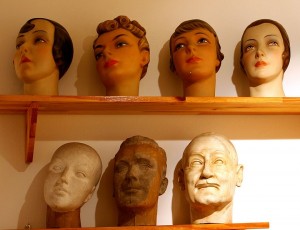
"He never greeted the judges when he passed them on the street – everyone looked similarly blank to him – and he developed a reputation for arrogance.," (Image by Przykuta.)
The opening of “Face Blind,” a 2007 Wired article by Joshua Davis about a neurological disorder that makes face recognition difficult–a confusing condition I myself have, though not quite as severely as the people in this article:
“BILL CHOISSER WAS 48 when he first recognized himself. He was standing in his bathroom, looking in the mirror when it happened. A strand of hair fell down – he had been growing it out for the first time. The strand draped toward a nose. He understood that it was a nose, but then it hit him forcefully that it was his nose. He looked a little higher, stared into his own eyes, and saw … himself.
For most of his childhood, Choisser thought he was normal. He just assumed that nobody saw faces. But slowly, it dawned on him that he was different. Other people recognized their mothers on the street. He did not. During the 1970s, as a small-town lawyer in the Illinois Ozarks, he struggled to convince clients that he was competent even though he couldn’t find them in court. He never greeted the judges when he passed them on the street – everyone looked similarly blank to him – and he developed a reputation for arrogance. His father, also a lawyer, told him to pay more attention. His mother grew distant from him. He felt like he lived in a ghost world. Not being able to see his own face left him feeling hollow.
One day in 1979, he quit, left town, and set out to find a better way of being in the world. At 32, he headed west and landed a job as a number cruncher at a construction firm in San Francisco. The job isolated him – he spent his days staring at formulas – but that was a good thing: He didn’t have to talk to people much. With 1,500 miles between him and southern Illinois, he felt a measure of freedom. He started to wear colorful bandannas, and he let his hair grow. When it got long enough, he found that it helped him see himself. Before that, he’d had to deduce his presence: I’m the only one in the room, so that must be me in the mirror. Now that he had long hair and a wild-looking scarf on his head, he could recognize his image. He felt the beginnings of an identity.
It gave him the confidence to start seeing doctors. He wanted to know if there was something wrong with his brain. His vision was fine, they told him – 20/20. One doctor suggested he might have emotional problems and referred him to a psychiatrist. In the medical literature, there were a few reports of head-injury and stroke victims who’d lost their ability to recognize faces. No one, as far as the doctors knew, had ever been born with the condition.
Conventional medicine, in other words, got him nowhere. So Choisser posted a message about his experiences on a Usenet group devoted to people with neurological problems. His subject line was ‘Trouble Recognizing Faces.’ After a few months, in late 1996, he received a solitary reply. ‘Hello, Bill,’ the email began, ‘I read what you wrote, and I think I have what you have.'” (Thanks Longreads.)
